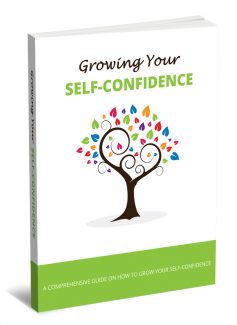 License Type: Master Resell Rights
License Type: Master Resell Rights  File Type: ZIP
File Type: ZIP
 SKU: 61467
SKU: 61467  Shipping: Online Download
Shipping: Online Download
Sample Content Preview
Introductory
How to get self-confidence is the central issue when tackling about the development of self confidence in an individual who, for long, have believed that his self-worth is deficient.
It goes without saying that those confident individuals can bear themselves better than those who have lower sense of the "self". They are the achievers, the people of the limelight, the center of the society. They walk straight, speak their meanings very well and influence people, both subtly and obviously. In short, they are those who care recognizable even from afar.
Sometimes, self-confident people are very much loved by the society. It is maybe due to their charisma or they are, by nature very amiable. However, there are those self-confident individuals who, just by leaving makes the room lighter.
These are two very dissimilar display of self-confidence. One, destroys a person's credibility and the other intensifies his personality. And obviously, you would not want the consequences of being too confident of yourself that the people no longer view you as effective, instead they see you as annoyance to their daily affairs.
Self-confidence comes from within. Outside stimulation may help but it would all still boil down to knowing yourself and using that knowledge to gain confidence.
To get self-confidence, you must realize that your limitations must not limit you and your attributes must not destroy you. Instead, use all these factors to develop a personality that would be productive for you and all those that surround you.
"Know thyself!", says the Oracle at Delphi. Though this might have been said thousands of years ago, it is undeniably true that we still can use the wisdom it says.
Know yourself and get confidence. Recognize though that knowledge comes nowhere but inside you. Thus, you have to accept the reality that unless you embrace you flaws and perfection, the demons of low self-confidence would stay forever lingering in your being.
There is a great risk in knowing too much of yourself though if your foundations of self-control is not much too developed. You would be exposed to your imperfections and since control is not yet yours, it is possible that you will be eaten by your own flows. This condition is closely intertwined with thought rumination wherein you seem to go around in your circle of thoughts about your losses and failures regardless of your achievements.
Another danger of having no control of yourself while trying to get self-confidence is that you might get too confident that you would forget the real value of having the sense of self. As we have mentioned earlier, over confidence is just as dangerous as having no confidence at all. This would send you back to failures or worse to eventual downfall.
Knowing yourself is one factor that may either be dangerous or productive. Self-awareness often times help people realize how wonderful their creation was. They learn to give worth to their capacities and attributes that are obviously as special as those that may be found with other people. We are all unique and that is a fact. Our marks of unique can be seen through closely looking at our capabilities and our incapacities. Our uniqueness is manifested on the natural gifts that add to our greater self-value. Our uniqueness can be seen though our potentials that we may either ignore or maximize at will.
All these are truths that would stay hidden to you unless you have learned to contemplate on your being and be aware of who you truly are.
Chapter 1: A Step in Building Your Self Confidence
Everything has to start somewhere. Unless you start revamping your self-confidence, you will have to agonize endlessly with the very thing you are fearful of- low self-confidence.
Our self-confidence is the accumulation of all our reactions to the experiences that life brought us, the manner by which we were guided by the older people in our environment and how we and the society view us. Many factors are contributors to our personal understanding of confidence.
One determining factor is how well we expect ourselves and the circumstances of our lives should be. Many tend to fall into the trap of creating unrealistic expectations. In the process, their losses are becoming too painful that they eventually suffer the effects of creating lower self-confidence.
Others, on the other hand, lean more on playing safe and thus create more achievable goals that are easier to attain. And because achievements add largely to the development of self-confidence, these people benefit from knowing that they are somehow capable of doing something.
You may already have heard the phrase - "it’s all in the mind". And to many psychological and emotional conditions, we can actually say that everything is all in the mind. They rooted and develop from the mind and so, the antidote might as well come from the same source.
You can always condition yourself to feel the way you want or to feel the way you don't want. You can suppress emotions and in the process, help emotions materialize. Say you want to feel hatred of yourself over not being good enough. If you make yourself believe in that hatred and you truly are convinced that you are not good enough, you will only get two products- one, genuine hatred and two, lower self-esteem.
The majority of us are caught unaware with our words. We sometimes fail to check ourselves of the things we are registering in our subconscious mind.








